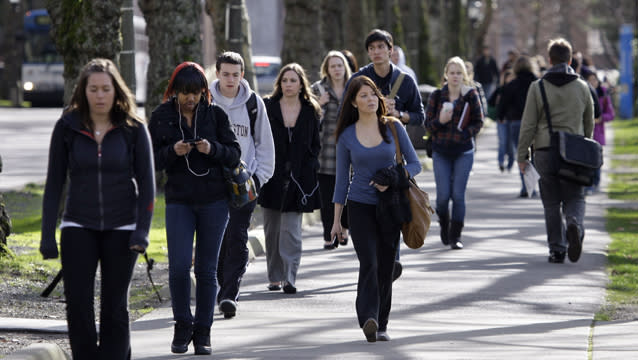The Five Biggest College Myths

It’s the conventional wisdom that students and parents do their research on colleges and costs before making any commitment to attend a particular institution.
A public college or university will cost close to $9,000 a year for tuition and fees for in-state students and $21,000 for out-of-state students, according to the College Board. A private college or university will run about $28,000 per year on average, and many cost more. Add room and board and the costs are close to $50,000 for four years at a state institution and $168,000 at a private one.
Related: America's Student Loan Crisis: Generation I.O.U.
Jeff Selingo, editor at large of The Chronicle of Higher Education, and author of College Unbound: The Future of Higher Education and What It Means for Students
, says America’s higher education system is broken because the enormous costs don’t justify the results. He appeared on The Daily Ticker special “Generation I.O.U.” event and shared his the biggest myths surrounding college:
Myth #1: American Colleges are the Best in the World. Selingo says the U.S. now ranks 14th in the world in higher education. In his book he writes, “American higher education has lost its way…costs are spiraling out of control and quality is declining, just as increasing international competition demands that higher education be more productive and less expensive.”
Myth #2: You Get What You Pay For. Not true, says Selingo. In his book he cites a study comparing the annual cost to attend the University of Pennsylvania ($43,738) to the annual cost for Penn State ($16,444) and concludes: “While there were some differences in the average starting salaries and mid-career salaries, there is virtually no significant difference between the lifetime earnings of each group of graduates.” Selingo also tells the panelists on our special Generation I.O.U. show, “Sometimes some people go to very expensive private colleges thinking that the cost of a college equals quality but we actually have no idea what a quality education really means because we really have no true measure of that.”
Myth #3: Most Students Graduate in Four Years. Fewer than 40% of students graduate within four years, according to The Chronicle of Education, and 58% of students graduate in six years. Many students don’t even graduate college, Selingo says, but they still have lots of debt to pay off. “You’re no better than a high school student,” he argues.
Myth #4: Majors Determine Your Future. False, according to Selingo. “In some industries, majors matter to the job (take engineering, as an example). But overall, I have found by talking to employers and educators that what they want most in their workers is the ability to learn how to learn….the capability to find the answers to the questions of tomorrow that we cannot envision asking today," Selingo writes.
Myth #5. Community College is For Losers. City College of New York President Lisa Staiano-Coico, tells our Generation I.O.U. panel that students who come to her four-year university after getting an associate’s degree from a community college “graduate very quickly...They’re motivated and they do very well and the tuitions are lower at community colleges."
Related: Yes, Despite the Student Loan 'Crisis,' College IS Worth It
William & Mary Economics Professor Robert Archibald, co-author of the book Why Does College Cost So Much?,
tells the panel that within Virginia’s public university system, community college students who take a particular curriculum and get a particular GPA are guaranteed to move onto a four year-school and “for economic reasons a lot of students are taking that path.” Selingo says community colleges are a good choice for students who don’t know what they want to do. Once they figure that out, they can transfer to a four-year college.
Selingo’s advice to students and parents when shopping around for a college: “Ask what are the chances of a someone like me graduating from your institution in two or four years or whatever it might be.”
Tell Us What You Think!
Got a topic you’d like covered? Have a guest you’d like to see interviewed? Send an email to: [email protected].
You can also look us up on Twitter and Facebook.
More from the Daily Ticker:
Can Glenn Hubbard Put the Thrifty Back Into the Economy?
Why Today's Market Selloff Could Be a Good Thing
Tesla Pays Back Washington: Do You Know Anyone Who Drives One?